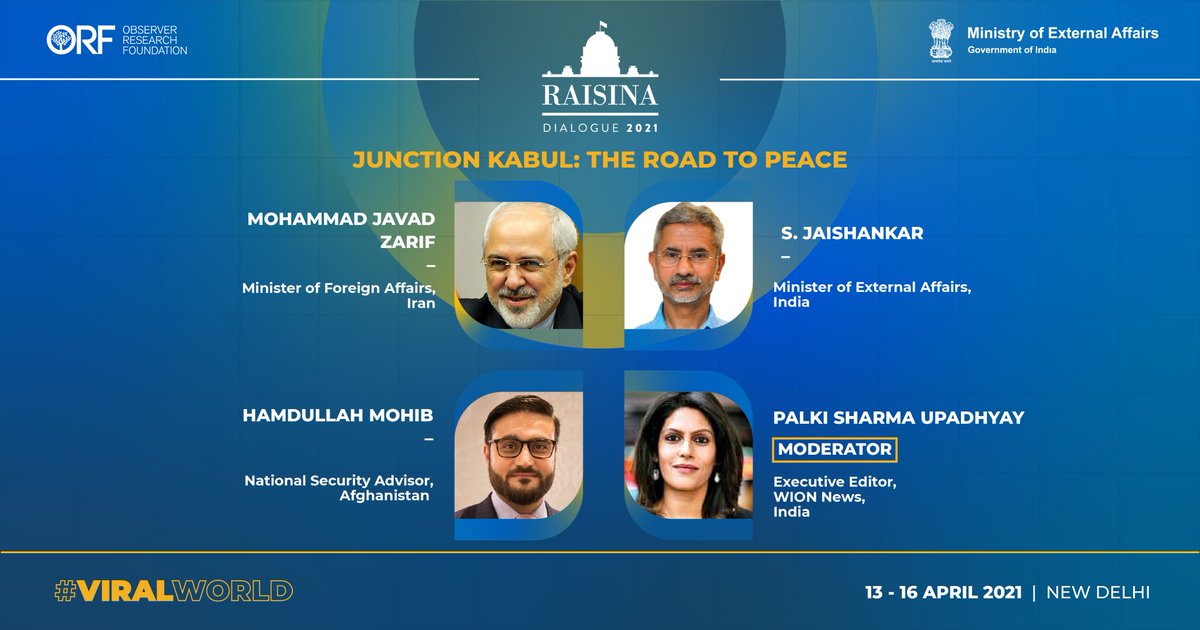
We are LIVE tweeting the discussion – “Chained Globalisation: Unshackling Lifelines, Unclogging Supply Chains” with @ManishTewari, @MConleytyler, @NaghmaSahar, @SoerenGade,Cho Choongjae and I-Chung Lai
Participate with #Raisina2021
Participate with #Raisina2021

.@NaghmaSahar: The global pandemic has undermined the convictions, certainties, and certitudes that have driven two decades of globalisation. It disrupted the supply chains and compelled countries to turn inwards and focus on self-reliance. #Raisina2021
.@NaghmaSahar: The pandemic has compelled the states and organisations to acknowledge that their global values chains and economic co-dependence had embedded social and political consequences. #Raisina2021
.@MConleytyler: The story of 2020 has been one of resilience and a global economy that has adjusted and managed. Australia is highly dependent on global supplies, and on minerals, agriculture, tourism, education which has all been hit hard. #Raisina2021
.@SoerenGade: Trade has led to an increase in global living standards. Protectionism will not do any good.
.@ManishTewari: Globalisation had its golden period from 1990-2008, but with the global economic meltdown of 2008, globalisation started coming under stress that was exacerbated by Eurozone crisis & subsequent events which led to the rise of right wing populism across the world.
Cho Choongjae: There is a need to strike a balance and harmony between economic efficiency and resilience. #Raisina2021
.@MConleytyler: The individual companies and firms have a whole range of tools they can use -- stockpile some critical elements, supply diversify, contingent contracting, build domestic capability and shorten supply chains. #Raisina2021
.@MConleytyler: Trade goes where trade wants to go and trying to push into a command economy has enormous cost for the wellbeing of the society. Both command and market can meet human welfare but empirically -- markets work best. #Raisina2021
.@MConleytyler: Markets create inequality -- we have to actively counter monopoly, corruption and make sure that externalities have been taken into account, specifically the environment for future generations. #Raisina2021
.@ManishTewari: The reason why manufacturing shifted from West to China is because it was cheaper to manufacture and because there were no regulations. No labour standards or oversight, pay suboptimal wages, & make extremely mercantile profits. #Raisina2021
.@ManishTewari: The fundamental postulate that ‘markets know best’ needs to be challenged. #Raisina2021
.@SoerenGade: It is important that the politicians stand up and declare that they should not use the pandemic to go back to protectionism, but use it in a new way. #Raisina2021
I-Chung Lai: There is a belief that the market will adjust itself, but in the last twenty years we have not seen this happen, in fact the market is doing what it is instructed to do by the government. #Raisina2021
I-Chung Lai: In past we allowed markets to choose our future trajectory but many intangible things like human capital, education & social distribution policies can't be done by countries alone unless we have a global solution & a global institution to coordinate #Raisina2021
I-Chung Lai: We need to rethink how we can make globalisation more humane and just, this will resolve problems related to opportunities for developing countries and human capital development. #Raisina2021
Cho Choongjae: Korea and India share common values such as democracy, free market economy and the rule of law. They share closer ties than ever before. India is a central pillar of Korea's New Southern Policy. #Raisina2021
We come to a close of our discussion - Chained Globalisation: Unshackling Lifelines, Unclogging Supply Chains.
Thank you for joining us! #Raisina2021
Thank you for joining us! #Raisina2021
• • •
Missing some Tweet in this thread? You can try to
force a refresh






